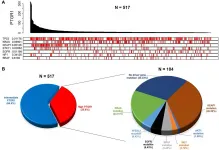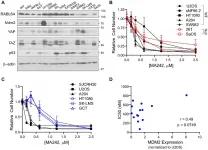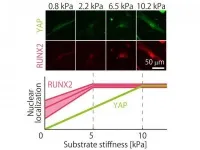(Press-News.org) Oncotarget published "The acylfulvene alkylating agent, LP-184, retains nanomolar potency in non-small cell lung cancer carrying otherwise therapy-refractory mutations" which reported that KEAP1 mutant NSCLCs further activate NRF2 and upregulate its client PTGR1. LP-184, a novel alkylating agent belonging to the acylfulvene class is a prodrug dependent upon PTGR1.
The authors hypothesized that NSCLC with KEAP1 mutations would continue to remain sensitive to LP-184. LP-184 demonstrated highly potent anticancer activity both in primary NSCLC cell lines and in those originating from brain metastases of primary lung cancers.
LP-184 activity correlated with PTGR1 transcript levels but was independent of mutations in key oncogenes and tumor suppressors.
Correlative analyses of sensitivity with cell line gene expression patterns indicated that alterations in NRF2, MET, EGFR and BRAF consistently modulated LP-184 sensitivity.
These correlations were then extended to TCGA analysis of 517 lung adenocarcinoma patients, out of which 35% showed elevated PTGR1, and 40% of those further displayed statistically significant co-occurrence of KEAP1 mutations.
The gene correlates of LP-184 sensitivity allow additional personalization of therapeutic options for future treatment of NSCLC.
The gene correlates of LP-184 sensitivity allow additional personalization of therapeutic options for future treatment of NSCLC.
Dr. Aditya Kulkarni from The Lantern Pharma, Inc. said, "KEAP1, KRAS, TP53 and STK11/LKB1 are among the commonly altered genes with considerable clinical prevalence in non-small cell lung cancers (NSCLC)."
The authors profiled primary and metastatic in vitro models of NSCLC for their sensitivity to LP-184 as well as standard of care agents, evaluated gene correlates of LP-184 response, and obtained evidence on in vivo anti-tumor effect of LP-184.
Mutated KEAP1 and concomitant decreased KEAP1 activity in cancer cells induces greater nuclear accumulation of NRF2, causing enhanced transcriptional induction of antioxidants, xenobiotic metabolism enzymes, and drug efflux pumps, thereby rendering KEAP1 mutations predictive of chemotherapy resistance in NSCLC patients.
The identification of a trend toward detrimental overall survival among a subset of platinum-treated NSCLC patients harboring co-occurring KRAS and STK11 mutations could label a more aggressive molecular subtype of NSCLC.
They therefore investigated LP-184 sensitivity in NSCLC cell lines harboring individual or concomitant mutations in KEAP1, KRAS, TP53 and STK11.
They sought to assess LP-184 activity in a panel of selected NSCLC adenocarcinoma cell lines, determine associations between genomic and transcriptomic profiles and responses of cell lines tested, and compare in vitro potency of LP-184 with that of approved chemotherapy agents.
The Kulkarni Research Team concluded in their Oncotarget Research Output, "Our key findings demonstrate that the alkylating agent LP-184 has nanomolar potency in several NSCLC cell lines and is more potent than selected approved alkylating chemotherapeutics. Additionally, LP-184 has the potential to target tumors with elevated PTGR1 regardless of presence of other co-occurring mutations but is especially found to be effective in the background of clinically significant KEAP1 mutations. We propose further evaluation of LP-184 in multiple PTGR1 high NSCLC settings that may not necessarily be mutually exclusive, including in highly prevalent KEAP1 and KRAS mutant tumors (Figure 6), and in patients with lack of actionable targets or resistance-related genes with no effective therapy options available."
INFORMATION:
Sign up for free Altmetric alerts about this article
DOI - https://doi.org/10.18632/oncotarget.27943
Full text - https://www.oncotarget.com/article/27943/text/
Correspondence to - Aditya Kulkarni - aditya@lanternpharma.com
Keywords -
non-small cell lung cancer,
acylfulvene,
alkylating agent,
PTGR1,
LP-184
About Oncotarget
Oncotarget is a bi-weekly, peer-reviewed, open access biomedical journal covering research on all aspects of oncology.
To learn more about Oncotarget, please visit https://www.oncotarget.com or connect with:
SoundCloud - https://soundcloud.com/oncotarget
Facebook - https://www.facebook.com/Oncotarget/
Twitter - https://twitter.com/oncotarget
LinkedIn - https://www.linkedin.com/company/oncotarget
Pinterest - https://www.pinterest.com/oncotarget/
Reddit - https://www.reddit.com/user/Oncotarget/
Oncotarget is published by Impact Journals, LLC please visit https://www.ImpactJournals.com or connect with @ImpactJrnls
Media Contact
MEDIA@IMPACTJOURNALS.COM
18009220957x105
Copyright © 2021 Impact Journals, LLC
Impact Journals is a registered trademark of Impact Journals, LLC
Oncotarget published "Prognostic and therapeutic value of the Hippo pathway, RABL6A, and p53-MDM2 axes in sarcomas" which reported that herein the authors evaluate expression of TAZ and YAP, the p53-MDM2 axis, and RABL6A, a novel oncoprotein with potential ties to both pathways, in sarcomas of different histological types.
Immunohistochemical staining of a tissue microarray including 163 sarcomas and correlation with clinical data showed that elevated YAP and TAZ independently predict worse overall and progression-free survival, respectively.
In the absence of p53 expression, combined TAZ and YAP expression adversely affect overall, progression free, and metastasis free survival ...
Regular consumption of milk is not associated with increased levels of cholesterol, according to new research.
A study published in the International Journal of Obesity looked at three large population studies and found that people who regularly drank high amounts of milk had lower levels of both good and bad cholesterol, although their BMI levels were higher than non-milk drinkers. Further analysis of other large studies also suggests that those who regularly consumed milk had a 14% lower risk of coronary heart disease.
The team of researchers took a genetic approach to milk consumption by looking at a variation in the lactase gene associated with digestion of milk sugars known as lactose.
The study identified that having the genetic variation where people can digest ...
Press release - Abstract 1394: Alterations in clock genes expression in Eutopic and Ectopic Endometrial Tissue
New research suggests that night shift work is linked to menstrual irregularity and increased chance of developing endometriosis
According to a study being presented at the 23rd European Congress of Endocrinology (e-ECE 2021), on Sunday 23 May at 19:00 CET (http://www.ece2021.org), women working night shifts may be at a greater risk of menstrual irregularity and developing endometriosis. The research found a reduction in the expression of PER-2, CRY-1 and CLOCK genes along with an increase in REV-ERBb in ectopic compared to ...
Bethesda, MD (May 23, 2021) -- Patients' irritable bowel syndrome (IBS) symptoms unexpectedly improved when they were under COVID-19 stay-at-home orders, reaffirming the gut-brain connection in functional gastrointestinal disorders, according to research that was selected for presentation at Digestive Disease Week® (DDW) 2021.
"One of our main hypotheses was that these patients were going to be worse because of pressure and stress due to COVID-19," said Juan Pablo Stefanolo, MD, a lead author on the study and a physician with the Neurogastroenterology and Motility section, Hospital de Clínicas José de San Martín, ...
Bethesda, MD (May 22, 2021) -- An artificial intelligence tool under development at Duke University can be added to the standard toilet to help analyze patients' stool and give gastroenterologists the information they need to provide appropriate treatment, according to research that was selected for presentation at Digestive Disease Week® (DDW) 2021. The new technology could assist in managing chronic gastrointestinal issues such as inflammatory bowel disease (IBD) and irritable bowel syndrome (IBS).
"Typically, gastroenterologists have to rely on patient self-reported information about their stool to help determine the cause of their ...
Tokyo, Japan - Researchers from Tokyo Metropolitan University have been quantifying how different batches of mesenchymal stem cells respond to the mechanical stiffness of their environments. They focused on how certain proteins were "localized" in cell nuclei and found key trends in how this changed with stiffness. Their findings explain inconsistencies between previous findings and may guide how scientists control the state of stem cells for research and medical treatments.
Mesenchymal stem cells (MSCs) are important "progenitor" cells that can transform into muscle, cartilage, bone or fat cells. In 2006, pioneering work by Engler and coworkers showed that they could control what cell type mesenchymal stem cells ...
Nearly half a billion people on the planet have diabetes, but most of them aren't getting the kind of care that could make their lives healthier, longer and more productive, according to a new global study of data from people with the condition.
Many don't even know they have the condition.
Only 1 in 10 people with diabetes in the 55 low- and middle-income countries studied receive the type of comprehensive care that's been proven to reduce diabetes-related problems, according to the new findings published in Lancet Healthy Longevity.
That comprehensive package of care ...
Business shutdowns reduce COVID-19 deaths, though with rapidly diminishing returns, with study of Italian lockdowns estimating they saved over 9,400 lives in under a month.
INFORMATION:
Article Title: Closed for business: The mortality impact of business closures during the Covid-19 pandemic
Funding: The author(s) received no specific funding for this work.
Competing Interests: The authors have declared that no competing interests exist.
Article URL: https://journals.plos.org/plosone/article?id=10.1371/journal.pone.0251373
...
Plant diseases don't stop at national borders and miles of oceans don't prevent their spread, either. That's why plant disease surveillance, improved detection systems, and global predictive disease modeling are necessary to mitigate future disease outbreaks and protect the global food supply, according to a team of researchers in a new commentary published in Proceedings of the National Academy of Sciences.
The idea is to "detect these plant disease outbreak sources early and stop the spread before it becomes a pandemic," says lead-author Jean Ristaino, William Neal Reynolds Distinguished Professor of Plant Pathology at North Carolina State University. Once an epidemic occurs it is difficult to control, Ristaino says, likening the effort to the one undertaken ...
Neurotic personalities found the pandemic most traumatic, while agreeable and conscientious personalities offered protection from the pandemic's negative impacts.
INFORMATION:
Article Title: Which personality traits can mitigate the impact of the pandemic? Assessment of the relationship between personality traits and traumatic events in the COVID-19 pandemic as mediated by defense mechanisms
Funding: The author(s) received no specific funding for this work.
Competing Interests: The authors have declared that no competing interests exist.
Article URL: https://journals.plos.org/plosone/article?id=10.1371/journal.pone.0251984
...


